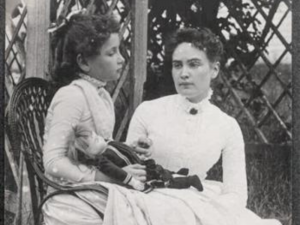
Benefits of Music Therapy for Children with Hearing Loss, Including Children with Cochlear Implants

Did you know that June 27 – July 3 is
“Helen Keller Deaf-Blind Awareness Week”?
What an inspiration she was and continues to be for people all around the world–especially for children with hearing and/or vision loss. We all remember hearing stories of young Helen and her educator, Anne Sullivan, who made it possible for Helen, against all odds, to communicate and go on to achieve many things in her life.
I always like to wonder, “What if Anne Sullivan had also been trained in Music Therapy?” Can you imagine the further benefits Helen Keller would have received!
Benefits of Music Therapy for Hearing-Impaired Children, Including Those with Cochlear Implants
-
Therapists work with children on their language, communication and cognitive skills, and as a result, their social skills are enhanced.
-
Because music has a higher variety of frequencies, it is more accessible on the continuum of hearing ability, over just the use of speech in therapy.
-
Music, being highly flexible, can be adjusted to the needs of the child’s hearing and language level, as well as the child’s age and musical preference.
-
It “Enhance[s] auditory, training and expand[s] the use of residual hearing.” (Music Therapy Association of British Columbia)
-
“Promote[s] socialization, self-awareness, emotional satisfaction and enhance[s] self-esteem.” (Music Therapy Association of British Columbia)
-
Therapy sessions are highly motivating and brings great joy to the child who might have to attend many doctors appointments.
Some Benefits for Visually Impaired Children
-
The most critical skills Music Therapy can develop are social skills, communication skills, and emotional regulation.
-
Learning how to negotiate your environment can be done by singing and the use of counting, beat and rhythm.
-
“The music therapist uses musical and non-musical approaches and interventions as a way to develop an individual’s ability to effectively communicate with their environment, interact comfortably in social situations, build self-awareness, self-motivation, and ultimately, perform in academic and post-academic settings.” (FamilyConnect.org)
-
Therapists work with the parents and children to create goals and strategies that are specific and individualized, ensuring the child makes progress in multiple areas of development.
-
Therapy sessions are fun and provide learning and growing opportunities that the children look forward to!
If you know any child who may benefit from Music Therapy, please let me know and I’d love to talk with you more.
References:
Music Therapy Association of British Columbia
FamilyConnect.org

